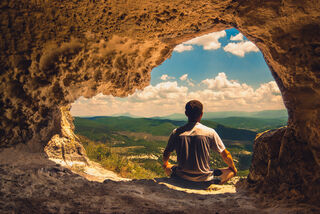Spirituality
Daily Spiritual Experiences Nourish Human Flourishing
Secular and theistic spirituality buffer against stress and promote flourishing.
Posted October 4, 2020 Reviewed by Ekua Hagan
"One may say, truly, I think, that personal religious experience has its root and center in mystical states of consciousness." —William James (The Varieties of Religious Experience, 1902)

In 2014, a Washington Post article, "New 'SoulPulse' app lets users monitor their spirituality in real-time," reported on experiential research being conducted via a smartphone app developed by Bradley Wright of the University of Connecticut to study people's "daily spiritual experiences" (DSE).
Now, the latest (2020) SoulPulse-based study led by Blake Victor Kent of Harvard University suggests that having daily spiritual experiences may create a buffer against stress, offset depression, and promote human flourishing.
For this smartphone-based study, the researchers collected self-reported DSE data twice a day for two weeks. After collecting large swaths of data, the researchers assessed both momentary state (single moments) and trait (two-week average) DSE scores and investigated how these experiences moderated stress, depressive symptoms, and flourishing. The findings (Kent et al., 2020) were published on August 24 in The International Journal for the Psychology of Religion. Wright is the senior author of this study.
The researchers describe human flourishing as "a well-being indicator that addresses happiness, life satisfaction, meaning and purpose, virtue, close social relationships." Based on their findings, Kent et al. conclude: "DSE may serve as a buffer against daily stressors at both the trait and state levels." They also note that their research "provides further evidence for flourishing as a holistic indicator of well-being."
"The findings indicate, as you would expect, that the wear and tear of daily stressors are associated with increased depressive symptoms and lower levels of flourishing," Kent said in an October 2 news release. "What this study really contributes is that daily spiritual experiences play an important role as well. Essentially, if you take two people who have equal levels of stress, the one with more spiritual experiences will be less likely to report depressive symptoms and more likely to indicate feelings of flourishing."
Ways to Increase Your Odds of Daily Spiritual Experiences
Last week, the Psychology Today editors bundled four thematically-related blog posts into a collection titled "How to Create a World of Wonder." The teaser for this collection: "Some experiences in life feel so special and magical that, for at least a moment, we feel transported to a place beyond the world of the common and ordinary. How to create wonder."
One of the posts included in this compilation is "The Surprising Power of Seeking a Daily Dose of Awe," in which I reported on a recent study (Sturm et al., 2020) that found that instructing someone to consciously turn his or her attention to something bigger than one's self during a 15-minute outdoor walk facilitated a smaller sense of self (i.e., "small self"), which reduced stress and boosted positive, prosocial emotions.
Fellow Psychology Today blogger, Michael Hogan, recently wrote about his research (Van Lente & Hogan, 2020) into five important aspects of oneness self-perceptions (OSPs) in a blog post, "The Experience of Oneness." Another PT blogger, Andy Tix, recently wrote about "The Need for Sacred Moments," which reported on another recently published study (Magyar-Russell et al., 2020), which found that experiencing sacred moments was linked to "higher levels of positive emotions and a greater presence of meaning, as well as lower levels of perceived stress, depressed distress, and anxious distress."
Although the latest study (2020) by Kent et al. uses the terminology "daily spiritual experiences" to describe what co-author Matt Bradshaw of Baylor University refers to as things like "feeling God's presence, finding strength in religion or spirituality, and feeling inner peace and harmony," there are countless other secular terms that people use synonymously to describe DSE such as "mystical experiences," "transcendent experiences," "oneness," "awe," "religious ecstasy," "wow! moments," or "sacred moments." This list of synonyms could go on and on.
Like many "spiritual experience seekers," my daily pursuit of DSE has evolved across my lifespan. One common thread is that I've consistently been influenced and guided by the writings of William James (1842-1910) and, in particular, his book The Varieties of Religious Experience. Another book that has helped me pinpoint when I'm most likely to have DSE is Ecstasy in Secular and Religious Experiences (1961) by Marghanti Laski.

How the variety of my secular and religious experiences has evolved over the years: As a kid growing up on Manhattan's Upper East Side, my family attended the Madison Avenue Presbyterian Church, but when NYC went bankrupt in the mid-1970s, we relocated to rural Pennsylvania and I became a Mennonite. As I've written about before, my earliest memories of having "religious" experiences occurred while listening to a vinyl 45 of "Morning Has Broken" by Cat Stevens in Sunday school and during horseback rides in the cornfields near Hershey's chocolate factory on my American Quarter Horse named "Commander," at sunrise or sunset.
As a Hampshire College student in Amherst, Massachusetts during the 1980s, I became an agnostic. Still, I found secular spirituality and what James called a "mystical state of consciousness" by doing lots of yoga and going on long, early-morning bike rides through the Pioneer Valley. (See "Flourishing in Life Does Not Require Straight A's.")
Again, in college, I recognized that sunrise and sunset are when I'm most likely to have what James would describe as "transcendent experiences" and Kent et al. describe as DME. Even though it's cliché, Van Morrison's "Sense of Wonder" (1985) was my go-to song during this era; playing this music on my Walkman was a catalyst for "transcendence."
How do you create wonder? How would you describe the variety of your secular or theistic spiritual experiences? Are there certain times of day, special places, or outdoor activities that tend to increase your odds of having daily spiritual experiences? Although our individual DMEs will always be personal and unique, there also tend to be some universal, well-established factors associated with these experiences.
In Lectures XVI and XVII: Mysticism, William James highlights four characteristics that often mark an experience as being mystical or "transcendent": 1) ineffability, 2) a noetic quality, 3) transiency, and 4) passivity. Of these four, transiency and passivity have been most useful, for me, in terms of increasing my odds of having a daily spiritual experience.
Is there a recipe for increasing one's odds of having DSE? Anecdotally, I know from decades of pursuing a sense of spiritual connectedness on a daily basis that the combination of listening to music that strikes a deep emotional chord while doing some type of aerobic exercise at sunrise is when I'm most likely to have a spiritual experience. If you prefer doing moderate-to-vigorous physical activity later in the day, I'd recommend going for a walk or jog at sunset while listening to music and reminding yourself to facilitate self-distancing via the "small self" by shifting your focus to something in the environment that's bigger than you.
References
Virginia Sturm, Samir Datta, Ashlin Roy, Isabel Sible, Eena Kosik, Christina Veziris, Tiffany Chow, Nathaniel Morris, John Neuhaus, Joel Kramer, Bruce Miller, Sarah Holley, and Dacher Keltner. "Big Smile, Small Self: Awe Walks Promote Prosocial Positive Emotions in Older Adults." Emotion (First published: September 21, 2020) DOI: 10.1037/emo0000876
Eric Van Lente and Michael J. Hogan. "Understanding the Nature of Oneness Experience in Meditators Using Collective Intelligence Methods." Frontiers in Psychology (First published: September 17, 2020) DOI: 10.3389/fpsyg.2020.02092
Gina Magyar-Russell, Kenneth I. Pargament, Joshua B. Grubbs, Joshua A. Wilt, Julie J. Exline. "The Experience of Sacred Moments and Mental Health Benefits Over Time." Psychology of Religion and Spirituality (Advance online publication: September 17, 2020) DOI: 10.1037/rel0000394
Blake Victor Kent, W. Matthew Henderson, Matt Bradshaw, Christopher G. Ellison & Bradley R.E. Wright. "Do Daily Spiritual Experiences Moderate the Effect of Stressors on Psychological Well-being? A Smartphone-based Experience Sampling Study of Depressive Symptoms and Flourishing." The International Journal of Psychology and Religion (First published: August 24, 2020) DOI: 10.1080/10508619.2020.1777766




